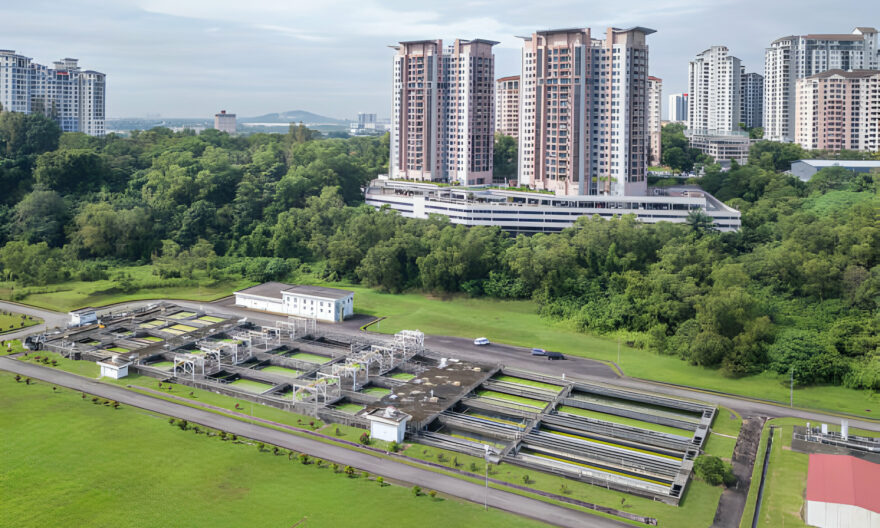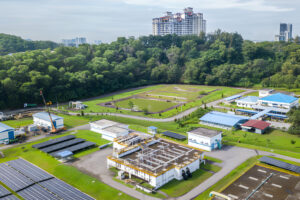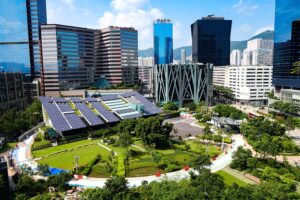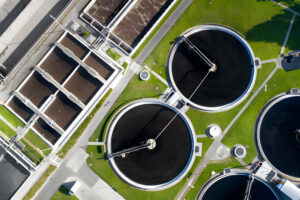
Malaysia is hot, humid, and sweaty – the perfect environment for things to get a little funky. Whether it’s your armpits or your cooling towers, proper treatment is essential. When it comes to industrial wastewater treatment, this tropical paradise can pose some unique challenges that will make you want to stay inside with the air con blasting. But fear not, we’re here to guide you through the steamy jungle of regulations, chemistry, and workplace antics. Put on your metaphorical pith helmet and let’s dive in!
Keeping It Cool: The Ins and Outs of Cooling Tower Treatment
Ahh the humble cooling tower. Tasked with the Herculean labor of rejecting heat from all those chugging machines inside, these unsung heroes can quickly turn into festering grottoes of bacteria if not handled with care. That’s where cooling tower chemical treatment comes into play. Think of it as SPF 1000 for your industrial processes.
These specialized chemicals serve as potent bodyguards, thwarting bacterial party crashers like Legionella which can spoil the party and give everyone the chills (literally). By controlling scaling, corrosion, and microbial growth, cooling tower chemical treatment ensures these critical systems stay operational so you don’t end up like a fish gasping for air.

It’s a delicate balance though. Over-treat and you’ll have the meager microbes begging for mercy. Under-treat and it’s a biohazard city. Getting it right means carefully monitoring chemical residuals and making adjustments as needed, kind of like maintaining the perfect pH in your pool (but way more important).
Navigating the Regulatory Rapids
Of course, wastewater treatment in Malaysia isn’t just about playing chemical cowboy. There are rules to follow – important ones that could make or break your operation. Understanding the requirements set by SPAN (that’s the National Water Services Commission) and the Department of Occupational Safety and Health (DOSH) is crucial.
They cover everything from discharge limits to safety protocols. Ignore at your peril because the fines will make you sweat even more than the tropical heat—partner with experienced firms that know the bureaucratic terrain and can act as your trusty sherpas.
Getting Nerdy With Chemicals and Equipment
Don’t let the light-hearted tone fool you, industrial water treatment is some serious stuff. Chemists and engineers in the field draw upon a vast well of scientific knowledge to formulate specialty chemicals, design treatment systems, and implement monitoring programs.
Terms like biocides, dispersants, and antiscalants roll off their tongues like poetry. They intimately understand the impacts of factors like cycles of concentration, saturation indices, and water chemistry on system performance. It’s complex work that requires careful strategizing and execution.
To keep up, companies need to invest in the proper equipment, analytical tools, and training. Water treatment programs aren’t something you rig up with duct tape and crossed fingers. Cheaping out leads to issues down the line, whether it’s ineffective results or catastrophic failures. Do it right the first time to save headaches later.
Humans of Water Treatment: Meet the Characters
Of course, this whole world of industrial water treatment isn’t just about equipment and chemistry. It’s also populated by a unique cast of professionals who could rival the staff of an eccentric 90s sitcom:
There’s the long-time in-house Water Treatment Guy, who’s been with the company since the beginning. His salt-and-pepper hair and leathery skin show he’s seen it all. He’s dialed in the perfect chemical dosages but guesstimates dates are fuzzy from decades of inhaling way too many biocides. He’s counting the days to retirement to finally buy that boat down in Langkawi.
Then you have the eager young technician straight out of university. Fresh-faced and full of energy, this bright-eyed graduate is loaded with book smarts but lacks practical application. After spilling chemicals all over his prized Ford Ranger on the first job, he quickly discovers sometimes the textbooks don’t quite prepare you for real-world chaos.
And of course, there’s the suave but slightly shady sales rep from the specialty chemical company. Could easily be mistaken for a used car salesman with his slick talk and bloated claims. He shows up in a flashy BMW touting his premium price tag as the value proposition, poking around existing systems for issues he can hard sell. Old Water Treatment Guy just rolls his eyes, knowing all chemical manufacturers say the same thing.
The supporting cast includes the accounting folks who always hassle with the water treatment expenses and the tough-as-nails DOSH inspector who strikes fear into everyone’s hearts during audits.
Expanding Into New Frontiers
While cooling towers are a major focus, industrial water treatment programs today encompass a wide range of systems and processes. From boiler water treatment to reverse osmosis membrane protection and wastewater recovery, programs are getting more diverse and sophisticated.
Leading companies are exploring innovative technologies like electro-deionization, ceramic membranes, and electrochemical water treatment. Advanced data analytics, automation, and the Internet of Things (IoT) are revolutionizing how treatment programs are monitored and optimized.
Even humble cooling towers are getting a high-tech makeover with smart sensors and controls. The aim is to reduce chemical usage, improve system reliability, and uncover valuable insights buried in operational data. Those who lean into these tools and technologies can gain a major competitive edge.
The Talent Crunch: Finding and Keeping Skilled Workers
As the field evolves, a big challenge is maintaining a skilled and capable workforce. Trained professionals proficient in chemistry, microbiology, equipment, and regulations are in high demand but in short supply.
Employers must get creative with training programs, professional development, and incentives to attract fresh talent and retain experienced veterans. Industrial water treatment can be a tough gig so companies need to invest heavily into making sure these workers have the technical knowledge, field experience, and passionate interest required.
This extends to suppliers, consultants, and partner firms as well. An inexperienced or understaffed chemical company can end up doing more harm than good. Due diligence is required to make sure you’re getting true industry experts and not just warm bodies.
Sustainability and the Future
Finally, sustainability and environmental impacts are becoming greater priorities. Industrial water treatment touches on major global issues like water scarcity, pollution, and climate change. Responsible companies are closely examining energy usage, chemical discharge, and waste.
Leading firms are exploring “greener” chemical formulations, optimal water reuse & recycling, and ways to reduce overall footprint. As regulations continually tighten and social consciousness grows, competitiveness will hinge on developing sustainable practices while still delivering effective treatment.
Water is a precious resource and industrial users must adapt to be part of the solution rather than contributing to the planetary crisis. Those who fail to evolve will be left behind in this new era. It’s a call to action for the entire water treatment community.




